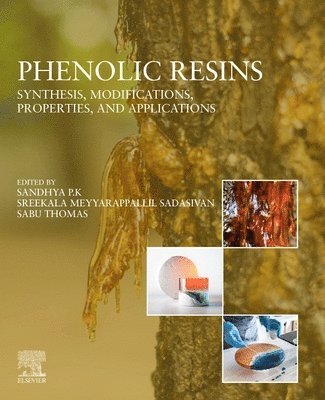
- Format
- Häftad (Paperback / softback)
- Språk
- Engelska
- Antal sidor
- 700
- Utgivningsdatum
- 2025-12-01
- Förlag
- Elsevier - Health Sciences Division
- Medarbetare
- Sadasi, Sreekala Meyyarappallil / Thomas, Sabu
- Antal komponenter
- 1
- ISBN
- 9780323956604
Phenolic Resins
Synthesis, Modifications, Properties, and Applications
Fler böcker av författarna
-
Non-Thermal Plasma Technology for Polymeric Materials
Sabu Thomas, Miran Mozetic, Uros Cvelbar, Petr Spatenka, K M Praveen
-
Nanoscale Materials in Water Purification
Sabu Thomas, Daniel Pasquini, Shao-Yuan Leu, Deepu A Gopakumar
-
Handbook of Engineering and Specialty Thermoplastics, Volume 4
Sabu Thomas, Visakh P M, Visakh P M
-
Handbook of Engineering and Specialty Thermoplastics, Volume 3
Sabu Thomas, Visakh P M, Visakh P M
Övrig information
Dr. Sandhya P.K. is an Assistant Professor at the Postgraduate Research Department of Chemistry, Sree Sankara College, Kalady, Kerala, India. She received her Master of Philosophy in Chemistry in 2009 at the same university. She has published several articles in international journals, presented her work at various international and national conferences, and co-authored multiple book chapters. Dr. Sandhya's research interests include the synthesis of nanomaterials such as graphene, phenol-formaldehyde resin based nanocomposites, and foams. Dr. M.S. Sreekala is an Assistant Professor at the Postgraduate Research Department of Chemistry, Sree Sankara College Kalady, India. An active researcher in the field of polymer science and technology, she has edited 6 books, and has over 50 research publications to her name. Dr. Sreekala received the prestigious Alexander von Humboldt (AvH) post-doctoral fellowship from the Humboldt Foundation, Bonn, Germany, and conducted research at the Institute for Composite Materials, University of Kaiserslautern, Germany. She was awarded the JSPS post-doctoral fellowship from Japan Society for Promotion of Science, Tokyo, Japan, and conducted research at the Department of Mechanical Engineering, Yamaguchi University, Japan. Prof. Sabu Thomas is a Professor of Polymer Science and Engineering and the Director of the School of Energy Materials at Mahatma Gandhi University, India. Additionally, he is the Chairman of the Trivandrum Engineering Science & Technology Research Park (TrEST Research Park) in Thiruvananthapuram, India. He is the founder director of the International and Inter-university Centre for Nanoscience and Nanotechnology at Mahatma Gandhi University and the former Vice-Chancellor of the same institution. Prof. Thomas is internationally recognized for his contributions to polymer science and engineering, with his research interests encompassing polymer nanocomposites, elastomers, polymer blends, interpenetrating polymer networks, polymer membranes, green composites, nanocomposites, nanomedicine, and green nanotechnology. His groundbreaking inventions in polymer nanocomposites, polymer blends, green bionanotechnology, and nano-biomedical sciences have significantly advanced the development of new materials for the automotive, space, housing, and biomedical fields. Dr. Thomas has been conferred with Honoris Causa (DSc) by the University of South Brittany, France.
Innehållsförteckning
1. Phenolic resins: state of the art, new challenges, and opportunities
2. Synthesis of resole and novolac phenolic resin
3. Synthesis of water soluble phenolic resin
4. Synthesis of oil soluble phenolic resins
5. Bio-mass derived phenolic resins
6. Substitution of phenol formaldehyde by novel synthetic resins - their performance and applications
7. Graphitization of phenolic resin
8. Mesoporous phenolic resin
9. Phenolic resin moulding methods
10. Phenolic resin based activated carbon
11. Toughening of phenolic resins
12. Boron modified phenoilc resins and properties
13. Cardanol modified phenolic resin
14. Phenolic resin from waste materials
15. Elastomer modified phenolic resin
16. Curing characteristics of phenolic resins
17. Structural characterization of phenolic resin
18. Morphology of phenolic resins
19. Fracture toughness of phenolic resins
20. Thermal characteristics of phenolic resins
21. Mechanical properties of phenolic resins
22. Adhesive property of phenolic resins
23. Rheological property of phenolic resin
24. Industrial applications of phenolic resins
25. Phenolic resin for high performance super capacitor application
26. Versatile applications of phenolic resins
27. Degradation of phenolic resin
28. Life cycle analysis of phenolic resins
Du kanske gillar
-
Hidden Spring
Mark Solms
B Format Paperback -
Is a River Alive?
Robert MacFarlane
Inbunden -
Orbital
Samantha Harvey
Häftad
